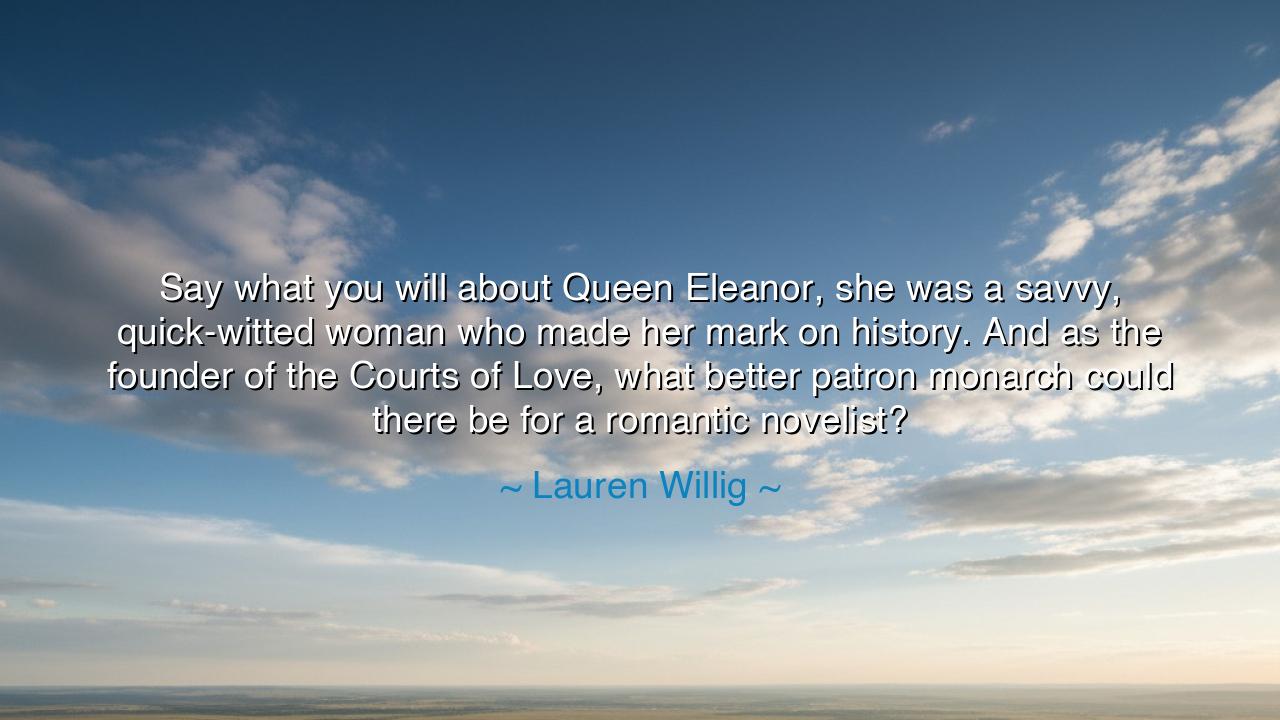
Say what you will about Queen Eleanor, she was a savvy
Say what you will about Queen Eleanor, she was a savvy, quick-witted woman who made her mark on history. And as the founder of the Courts of Love, what better patron monarch could there be for a romantic novelist?






"Say what you will about Queen Eleanor, she was a savvy, quick-witted woman who made her mark on history. And as the founder of the Courts of Love, what better patron monarch could there be for a romantic novelist?" These words from Lauren Willig shine a light on the remarkable and often underestimated legacy of Queen Eleanor of Aquitaine. Her intelligence, wit, and ambition were not only influential in her own time, but they also left an indelible mark on the very fabric of history. In her time, she was a woman who deftly navigated the treacherous political landscapes of both France and England. Yet, it is her role as the founder of the Courts of Love that ties her to the world of romance—a legacy that still resonates in the stories of courtly love and romantic novels today.
Eleanor, born into the powerful and wealthy Aquitaine family, was a woman of remarkable courage and intelligence. She was not merely a queen by virtue of her marriage to two powerful kings—Louis VII of France and Henry II of England—but a queen who wielded power in her own right. She was a patron of the arts, of literature, and, most notably, of the romantic tradition. Through the establishment of the Courts of Love, she created a space for the exploration of romantic ideals, where knights, poets, and noblemen could gather to discuss and debate the nature of love, honor, and devotion. In many ways, Eleanor planted the seeds for the chivalric ideals that would later permeate medieval literature, giving rise to tales of heroic love that continue to inspire stories today.
The Courts of Love were not mere social gatherings, but symbolic tribunals where lovers and poets could engage in philosophical discussions about the most sacred of human emotions. These courts became a breeding ground for romantic ideals—ideas about unattainable love, devotion, and the sacredness of the knightly code. One of the most prominent figures of this movement was the poet André le Chapelain, whose writings helped to crystallize the notion of courtly love, a concept that would later dominate medieval literature. The courts, under Eleanor's patronage, thus became an important space for the intersection of romance and politics, where the boundaries of love and power were both explored and expressed.
The legacy of Queen Eleanor is, therefore, as much about her role in the political arena as it is about her contribution to the cultural and romantic landscape of the time. Her wit and savvy were not only essential in securing her power and influence, but also in fostering an environment where the ideals of romanticism could flourish. Eleanor's influence on the world of romantic literature is profound, as it was under her patronage that the notion of chivalry—where love and honor are intricately intertwined—came to life. This notion has since been immortalized in countless romantic novels, where knights, lords, and ladies still engage in the same pursuit of pure, unrequited love that Eleanor helped to create.
Think of the legendary tales of Lancelot and Guinevere, Tristan and Isolde—these stories, born from the traditions of courtly love, echo Eleanor's creation of the Courts of Love. Through these tales, we understand that love is not only a matter of emotion but of honor, of noble sacrifice, and of pursuing a love that transcends earthly constraints. In the world of romantic novels, we find echoes of the medieval courtly love that Eleanor championed. Just as Eleanor once played a pivotal role in setting the stage for these lofty ideals, so do modern storytellers continue to be inspired by the profound, sometimes tragic, nature of love that she helped shape.
The lesson that we can take from Eleanor's life and Lauren Willig’s reflection is one of empowerment and vision. Like Eleanor, who turned her intelligence and influence into an enduring legacy, we too can shape the world around us through creativity, leadership, and wisdom. Eleanor did not simply follow the paths laid before her; she created new avenues for thought, for culture, and for romance. She was not just a monarch, but a visionary who saw the world through the lens of possibility—where even love could be elevated to the level of philosophy and art.
In your own life, ask yourself: where can you bring about change? What legacy can you leave, not by merely following the expected paths, but by crafting something entirely new, something that will inspire generations to come? Whether in love, in work, or in creativity, Queen Eleanor shows us the power of vision, of creating spaces where the unexpected can happen, where romance and reason can coexist, and where even the most idealistic dreams can shape the world. Let her story inspire you to be bold, to see beyond the immediate, and to create the possibilities that others might not yet imagine.






AAdministratorAdministrator
Welcome, honored guests. Please leave a comment, we will respond soon